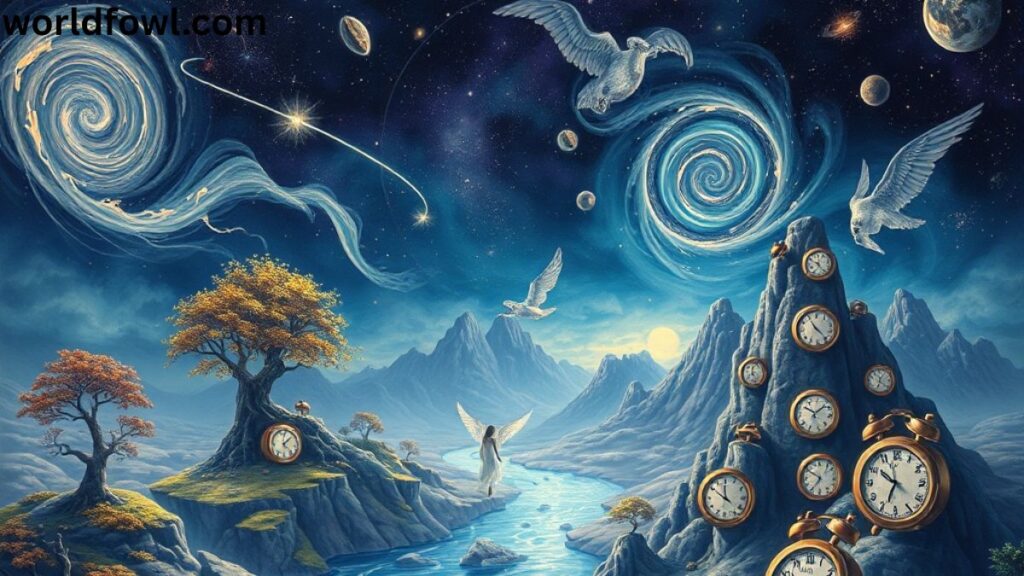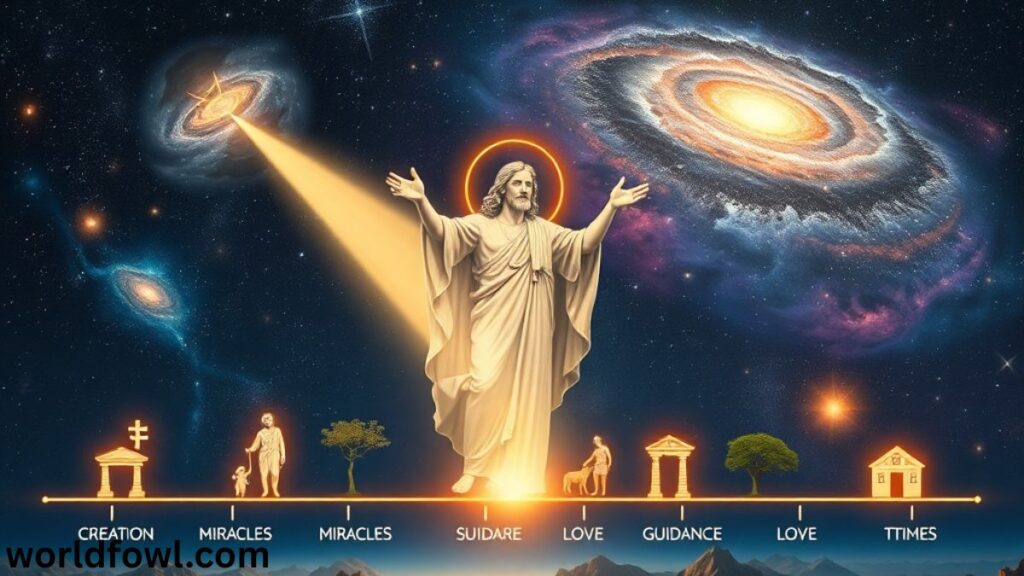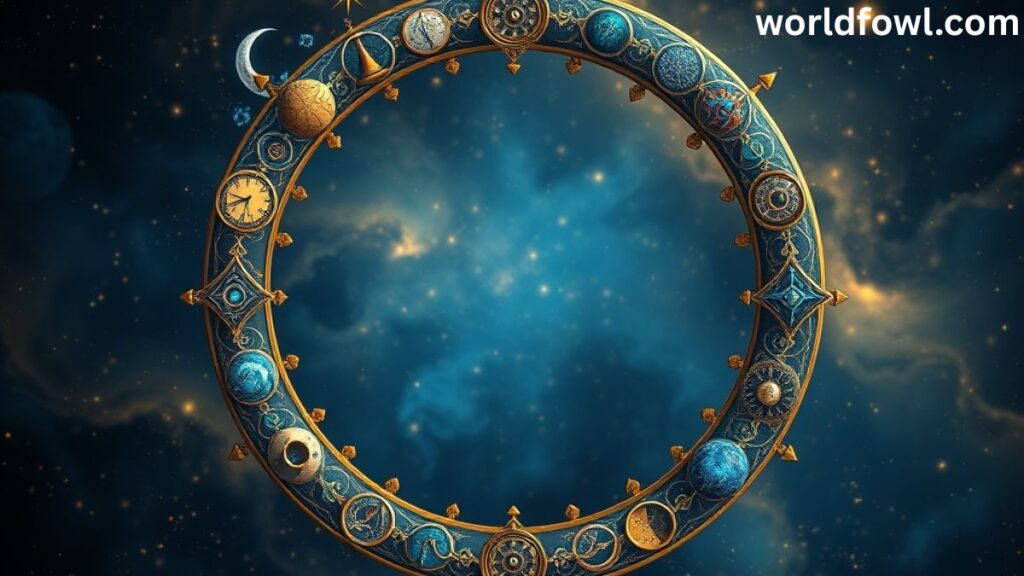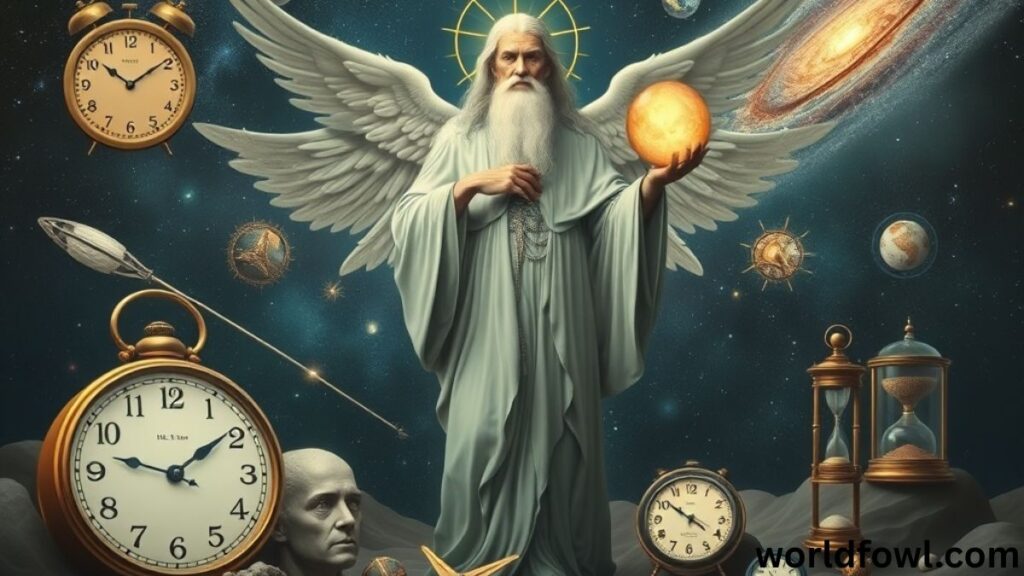How old is God explores one of humanity’s most profound theological questions—the nature of divine existence beyond temporal constraints. This inquiry challenges our fundamental understanding of time itself, as it applies to the eternal God who exists outside the framework that governs our daily lives. The concept doesn’t ask for a numerical age but instead probes the very essence of God’s timeless nature and unchanging character.
Here’s what shatters conventional thinking: every star, mountain, and human being we’ve ever encountered has a starting point—except God. While scientists can date the universe to 13.8 billion years and trace human history through millennia, God’s uncreated existence defies this pattern entirely. He stands as the first cause, the self-existent God who predates time itself.
Biblical scripture reveals that God always existed before creation began and will continue existing after everything else ends. The divine nature described in passages like Psalm 90:2 presents God as existing “from everlasting to everlasting”—a reality that transcends our temporal experience. Understanding God’s eternal presence fundamentally reshapes how believers approach faith, trust, and their relationship with the immortal God who invites finite beings into infinite communion.
God Has No Birthday
Think about birthdays for a moment. They mark the anniversary of when we entered this world. Your birth certificate records the exact date, time, and location. It’s concrete proof of your beginning.
God has no birthday because He never began.
This concept rattles our everyday experience. Everything we encounter has a starting point. Your smartphone was manufactured on a specific date. The house you live in was built during a particular year. Even the oldest mountains were formed through geological processes that scientists can date. But God’s uncreated existence defies this pattern completely.
What Scripture Reveals
The Bible offers profound insights into this mystery:
Psalm 90:2 declares: “Before the mountains were brought forth, or ever you had formed the earth and the world, from everlasting to everlasting you are God.”
Notice that phrasing—”from everlasting to everlasting.” Moses, who penned this psalm, wasn’t describing someone who started existing a really long time ago. He was pointing to something far more radical: God’s eternal existence that predates all creation.
Revelation 22:13 presents Jesus as the “Alpha and Omega, the first and the last, the beginning and the end.” These Greek letters bookend the alphabet. They symbolize totality, completeness, and the encompassing of all things. This passage affirms that God’s self-existence spans beyond any temporal framework we can imagine.
The Problem With Asking “Who Created God?”
Children often ask this question, and it’s actually brilliant in its simplicity. If everything needs a creator, then who created God?
The question contains a flawed premise. Not everything requires a creator—only things that begin need a cause. God outside of time never began, so He doesn’t need a creator. He’s the uncreated creator, the first cause that set everything else in motion.
| Created Things | God’s Nature |
|---|---|
| Have a beginning | No beginning |
| Exist within time | Exists beyond time |
| Subject to change | Unchanging nature of God |
| Limited lifespan | Infinite lifespan |
| Dependent on causes | Self-existent God |
This table illustrates the fundamental difference. We’re comparing apples to… well, something that isn’t even fruit. God’s attributes place Him in a category utterly distinct from His creation.
What Does “Eternal” Mean?
We toss around the word “eternal” pretty casually. “This meeting feels eternal.” “That movie was eternally long.” But what does eternity actually mean when applied to God’s infinite nature?
Eternal doesn’t just mean “a really, really long time.” That’s still time—just stretched out. True eternity means existing outside time’s stream altogether.
Time as a Created Dimension

Here’s where it gets fascinating. Time itself is part of the created order. Before God spoke the universe into existence, there was no time. No ticking clocks, no sunrise and sunset, no yesterday or tomorrow.
When Genesis 1:1 states, “In the beginning,” it’s describing the moment when time began—not when God began. God was already there in His non-temporal being, and He initiated the timeline we all inhabit.
Think of it this way: An author exists outside the story she writes. She’s not bound by the narrative’s chronology. She can skip to the ending, revise the middle, or start wherever she chooses. Similarly, God’s eternal timeline encompasses all of human history in a single, comprehensive view. Past, present, and future are all simultaneously present to Him.
Breaking Down “Everlasting”
The term “everlasting” appears throughout scripture when describing God. But even this word can mislead us. In English, “everlasting” might suggest “lasting forever into the future”—which still implies a temporal direction.
The Hebrew word olam and the Greek word aionios carry richer meanings. They point to:
- Perpetual existence without interruption
- Timelessness that transcends sequential moments
- Infinite continuity that has no terminus
When we say God’s eternal presence is everlasting, we’re affirming that He never stops being present, never phases in or out, and maintains constant reality regardless of what happens in our temporal world.
Philosophical Perspectives on Divine Eternity
Theologians have debated divine eternity doctrine for centuries. Two main camps have emerged:
Timeless Eternity (Classical View)
God exists in an eternal “now” with no succession of moments. He doesn’t experience past, present, or future sequentially. Everything is simultaneously present to Him. This view emphasizes God’s perfection and unchanging character—change implies imperfection or lack, which God cannot possess.
Everlasting Temporality (Open View)
God exists through all time but experiences it somewhat sequentially. He’s everlastingly present at every moment but interacts with creation as events unfold. This view attempts to preserve divine foreknowledge while allowing for genuine relationships with temporal beings.
Most orthodox Christian doctrine of God leans toward the timeless view. It better accounts for passages describing God’s immutability and His transcendent nature.
Does God Age?
The short answer? Absolutely not. But let’s explore why.
Aging implies deterioration, development, or change across time. Your body ages as cells divide and eventually wear out. Your mind ages as you accumulate experiences and (hopefully) wisdom. Even stars age, burning through their nuclear fuel until they eventually die.
God doesn’t change—this is what theologians call divine immutability.
What Immutability Means
Malachi 3:6 states plainly: “For I the Lord do not change; therefore you, O children of Jacob, are not consumed.”
This isn’t merely saying God has a consistent personality. It’s declaring that His essential being, His purposes, His knowledge, His power—none of these fluctuate. He doesn’t improve because He’s already perfect. He doesn’t diminish because He’s infinite. He doesn’t learn because He’s omniscient God. He doesn’t need to adapt because He already comprehends all possibilities.
James 1:17 reinforces this: “Every good gift and every perfect gift is from above, coming down from the Father of lights, with whom there is no variation or shadow due to change.”
The imagery here is striking. Shadows shift as light sources move or as objects rotate. But with God, there’s no variation, no shadow—complete constancy in His unchanging nature of God.
How This Differs From Our Experience
We can’t help but age. It’s baked into our biology. From the moment we’re born, time works on us:
- Infants become children
- Teenagers become adults
- Adults become older people,
- Physical capabilities rise and fall
- Memories accumulate and fade
God’s ageless existence means He never progresses through these stages. He doesn’t mature, doesn’t learn from mistakes, doesn’t forget. The God who spoke to Moses is identical to the God present today—not just similar, but absolutely identical in essence.
This can be difficult to grasp because we live in constant flux. Even our most stable traits shift over decades. But God as “I AM” remains the ultimate fixed point in reality.
What About God’s Actions in Time?

Some people get confused here. If God never changes, how does He do different things at different times? How did He create the world at a specific point? How does He answer prayers and interact with us?
The answer lies in distinguishing between God’s essence and His actions. God’s fundamental nature never changes, but He freely chooses to act within time. His knowledge of what He would do was eternal, but the effects of His actions occur at specific temporal moments.
It’s like a playwright who has always known every line of the play but allows the drama to unfold scene by scene for the audience. The playwright’s knowledge is complete from the start, yet the play progresses.
Why It Matters That God Is Eternal
Okay, so God exists outside time and never ages. That’s philosophically interesting, but why should you care? What practical difference does God’s eternal nature make in your daily life?
Turns out, quite a lot.
Absolute Reliability
If God could change, how would you know He’d keep His promises? What He pledged yesterday might not hold tomorrow. But an unchanging God provides an anchor of certainty.
Hebrews 6:17-18 emphasizes this connection: “So when God desired to show more convincingly to the heirs of the promise the unchangeable character of his purpose, he guaranteed it with an oath, so that by two unchangeable things, in which it is impossible for God to lie, we who have fled for refuge might have strong encouragement.”
Your circumstances shift constantly. Your feelings fluctuate. Your relationships sometimes falter. But God’s commitments remain rock-solid because He Himself is unchangeable. When He says He’ll never leave you or forsake you, that promise is as valid today as it was two thousand years ago—and it’ll be just as valid two thousand years from now.
Comprehensive Knowledge
An eternal presence means God knows everything that happens across all of time. He’s not learning as history unfolds. He doesn’t react in surprise to developments. This is the omniscient God described throughout scripture.
This should comfort you when life feels chaotic. God isn’t figuring things out as He goes. He already knows how your story ends, and He’s working all things together according to His purpose. Nothing catches Him off guard.
Isaiah 46:10 declares: “I make known the end from the beginning, from ancient times, what is still to come.”
Perfect Timing
Because God outside of time sees all moments simultaneously, His timing is impeccable. What feels like a delay to you might be perfectly orchestrated from His eternal vantage point.
Ever notice how things sometimes come together in ways you couldn’t have planned? Connections you make, opportunities that emerge, problems that resolve just when you’ve reached your limit—these often reflect divine constancy working across time with precision you can’t fully appreciate from your limited perspective.
Inexhaustible Resources
An infinite being never runs out of anything. God’s patience doesn’t wear thin. His power doesn’t deplete. His creativity doesn’t dry up. His love doesn’t expire.
Compare this to human limitations:
- Parents get exhausted caring for young children
- Teachers run out of patience with difficult students
- Friends sometimes tire of helping with the same recurring problems
- Leaders eventually burn out from constant demands
But the immortal God never faces these constraints. His capacity to help, guide, forgive, and sustain you remains perpetually full. You literally cannot exhaust His resources.
Foundation for Trust
Psalm 90:1 connects God’s eternity directly to our security: “Lord, you have been our dwelling place throughout all generations.”
Moses wrote this in the wilderness. The Israelites had no permanent home, wandering in harsh terrain. But Moses identified their true dwelling place—not a physical location, but the eternal God who provided refuge regardless of their geographical instability.
Your circumstances might be temporary and uncertain. Your health may fluctuate. Your finances could be unstable. Your relationships might feel shaky. But you’re anchored to something—someone—utterly permanent. That’s not just comforting; it’s transformative.
A Better Picture: A Circle That Never Ends

Abstract concepts become clearer with concrete illustrations. So let’s paint a better picture of God’s timeless existence.
The Circle Metaphor
Imagine a circle. Where does it begin? Where does it end? It has neither starting point nor terminus—it simply is, complete and whole.
This captures something essential about eternity. It’s not a line stretching infinitely in both directions (though that’s closer than thinking of a single starting point extending forever forward). It’s more like a circle: complete, whole, with no beginning and no end.
God exists in this perpetual completeness. He’s not progressing from past to future. He simply exists in fullness.
The Ocean Analogy
Here’s another angle. Picture yourself in a boat on the ocean. You experience the waves sequentially—one passes, then another arrives. You’re subject to their rhythm, their timing.
Now imagine you’re a satellite viewing that same ocean from space. You see all the waves simultaneously—those forming in the distance, those currently hitting the boat, those dissipating behind. You comprehend the entire pattern at once.
God’s eternal perspective resembles the satellite view, except even more complete. He doesn’t just see all temporal moments spread out spatially. He somehow comprehends them in a single, eternal “now” that our temporal minds can’t fully grasp.
The Author Comparison
I mentioned this earlier, but it’s worth expanding. An author creates characters and plot lines. Those characters experience events in sequence—first this happens, then that, leading to a climax and resolution.
But the author exists outside the story’s timeline. She knows the ending before writing the beginning. She can revise earlier chapters based on what she plans for later ones. The narrative has chronology, but the author transcends it.
Similarly, God before creation existed with complete knowledge of all that would unfold. He’s not discovering history as it happens. He’s the divine Author who transcends the story while remaining intimately involved with every detail.
Why Analogies Fall Short
All these comparisons limp somewhat. Circles, satellites, and authors still exist within time—they’re just helpful ways to point toward something beyond our full comprehension.
God’s limitlessness ultimately exceeds our analogies. We’re using temporal concepts to describe the non-temporal being. It’s like trying to explain color to someone who‘s been blind since birth—your words can point in the right direction, but the full experience remains elusive.
That’s okay. We’re not meant to fully comprehend infinity. The goal is to grasp enough that we can relate rightly to the eternal God, trust Him appropriately, and live with the confidence His unchanging character provides.
So, How Old Is God?

We’ve circled back to the original question. After exploring scripture, philosophy, and practical implications, what’s the answer?
God is not old at all—because age doesn’t apply to Him.
He’s not a billion years old. He’s not infinitely old. Those phrases still assume temporal measurement. God transcends age entirely.
The Best Biblical Answer
When Moses asked God His name, God responded: “I AM WHO I AM” (Exodus 3:14). This cryptic phrase reveals something profound about divine nature.
“I AM” speaks to perpetual, present existence. Not “I was” or “I will be,” though those are true too. The fundamental declaration is present-tense being—forever existence in an eternal now.
Jesus later used this same phrase, identifying Himself with the eternal God: “Before Abraham was, I AM” (John 8:58). This wasn’t poor grammar. It was a direct claim to God’s self-existence and timeless existence.
Beyond Human Categories
Our language breaks down when discussing God’s age explained. Every term we use—young, old, ancient, eternal—carries temporal baggage that doesn’t quite fit.
Perhaps the closest we can get is this: God simply exists. He’s the ultimate reality from which all other existence flows. He doesn’t have an age any more than existence itself has an age.
When you ask “How old is God?” you’re essentially asking, “How long has existence existed?” It’s a category mistake—like asking what color mathematics is or how much justice weighs.
What We Can Affirm With Confidence
Even if we can’t calculate God’s age, we can make several definitive statements:
- God always existed before anything else
- He will continue existing after everything else ends
- He created time itself and operates independently of it
- His nature never changes or deteriorates
- He comprehends all temporal moments simultaneously
- No past event limits His present capability
- No future circumstance threatens His eternal stability
These truths form the foundation of Biblical view of God’s age and provide solid ground for faith.
Living in Light of Eternity
Understanding God’s timeless nature should affect how you live right now:
Perspective on Problems
Your current crisis, while very real to you, is a momentary blip from an eternal vantage point. This doesn’t minimize your pain, but it does contextualize it. The eternal God sees beyond your present struggle to the resolution and redemption He’s orchestrating.
Patience with Process
God isn’t rushed. He works on eternal timelines, not human schedules. When prayers seem unanswered or promises delayed, remember that divine eternity doctrine teaches that His timing, though mysterious, is perfect.
Investment in Eternal Things
If God is eternal and you’re made for relationship with Him, that relationship transcends your earthly lifespan. Investing in spiritual growth, character development, and loving others isn’t just for this life—it has everlasting significance.
Confidence in Uncertainty
When the future feels terrifyingly uncertain, you can trust in the One who sees it all clearly. His eternal presence extends into your tomorrow, and He’s already there, preparing the way.
Conclusion
How old is God? The answer defies our expectations completely. God isn’t old at all because age simply doesn’t apply to Him. He exists outside time’s boundaries, never aging, never changing, always present. The eternal God transcends our temporal measurements while remaining intimately involved in every moment of human history. His unchanging nature provides the ultimate foundation for trust and hope.
How old is God? This question leads us to something far greater than a numerical answer. It reveals the timeless God who was never born and will never die. He’s the I AM—perpetually present, infinitely powerful, and completely reliable. While we age and circumstances shift constantly, God remains the unchanging anchor. His eternal presence transforms how we face uncertainty, offering security that nothing temporal can provide. You don’t need to fully comprehend eternity to benefit from the everlasting God who invites you into relationship today.








